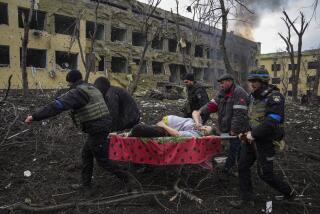Iraq doc maker saw a ‘sense of arrogance’
- Share via
Charles Ferguson, the writer-director of “No End in Sight,” a documentary about America’s involvement in Iraq, initially was “sympathetic” to the idea of using military force to push Saddam Hussein from power.
“I thought if it was done competently, with a large international coalition and a lot of U.N. involvement, it would bring good things,” says Ferguson, who has been a visiting scholar at Massachusetts Institute of Technology and UC Berkeley. “No End in Sight,” which opens Friday, is his first feature.
But, he says, he became concerned even before the U.S. invaded Iraq in the spring of 2003. “There were reports about disagreements on how many troops to use,” Ferguson says. “The attitude of the Bush administration toward the international community and the United Nations was quite disturbing -- the kind of sense of arrogance you felt from the way the administration was conducting itself.”
After the fall of Baghdad, Ferguson’s worries escalated when looting broke out. “In mid-2004, I had dinner with George Packer, who is a journalist for the New Yorker
and over the course of a three-hour dinner with George it became clear that things
were much different than their public portrayal either by the administration or in general in the media. That is when I had the idea to make the film.”
Based on about 200 hours of footage, the documentary features interviews with such officials as former Deputy Secretary of State Richard L. Armitage; former Ambassador Barbara Bodine; retired Army Col. Lawrence Wilkerson, former chief of staff to Secretary of State Colin Powell; and retired Army Lt. Gen. Jay Garner, who was in charge of the occupation of the country in May 2003.
Ferguson also spent two months in Iraq last year, including two weeks in Baghdad, where he lived in a fortified compound outside the Green Zone.
“There were two different ways to go out -- high profile and low profile,” he says. “With high profile, there are three armored cars and eight to 10 bodyguards with automatic weapons. That is the way I traveled most of the time. You have to stay alive.
“Low profile is you are dressed as an Iraqi with a bilingual interpreter next to me and a half a dozen guards around me but dressed in plainclothes with concealed weapons. That way I was permitted to walk around for a half-hour at a time and talk to the people on the street.”
Amid debate on whether the U.S. should stay or go, Ferguson believes there will be some American presence in Iraq for a “very long time.”
“Most people I talk to think if the Americans pull out completely,” he says, “there would be a blood bath and a possible regional war.”
More to Read
Only good movies
Get the Indie Focus newsletter, Mark Olsen's weekly guide to the world of cinema.
You may occasionally receive promotional content from the Los Angeles Times.











